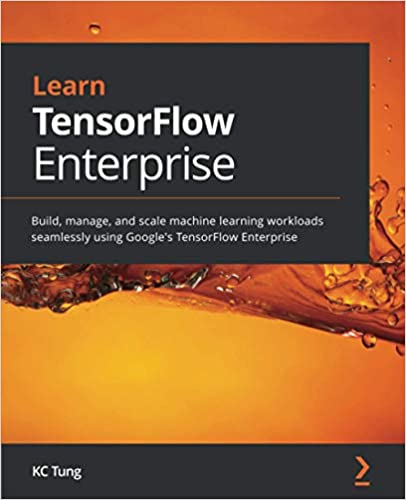KC Tung is the author of Learn TensorFlow Enterprise, we got the chance to sit down with him and find out more about his experience of writing with Packt.
Q: How did you become an author for Packt? Tell us about your journey.
KC Tung: I have been in the data science career since six years. During this time, I attended and spoke at many AI/ML conferences, where I presented the work I did with TensorFlow. Later I was contacted by an acquisition editor to write this book.
Q. What was your motivation for writing this book? How long did it take you to write the book?
KC Tung: I want to help readers with using TensorFlow at scale suitable for enterprise requirements. It took six months to write the book.
Q: What kind of research did you do, and how long did you spend researching before beginning the book?
KC Tung: I dig into TensorFlow’s YouTube content quite often for research and understand what the latest trends are. It is a process that never ceases as I write the book.
Q: Did you face any challenges during the writing process? How did you overcome them?
KC Tung: Definitely. I have a day job, and managing my time is tricky. Another challenge related to writing is actually deciding what content to include, what will appeal to most audiences, and what will be relevant in years to come. These are decisions that I had to make and I have to constantly pay attention to what progress or incremental improvement is made by TensorFlow or GCP team as I write, even though the outline is set.
Q: What’s your take on the technologies discussed in the book? Where do you see these technologies heading in the future?
KC Tung: Cloud based platforms for training and deploying ML models is necessary for enterprise applications. In order to develop ML models at scale, cloud based platforms are indispensable. Another technology that I’d like to mention is model optimization. ML models, especially with deep learning based architecture, are inevitably very large. For edge deployment or deployment in resource-limited scenarios, it means the large, heavy-weight models have to be smaller or light-weight. Therefore, TF.Lite optimization plays an important role in shrinking model size while having none or negligible impact to model performance.
Q. Why should readers choose this book over others already on the market? How would you differentiate your book from its competition?
KC Tung: This book teaches readers how to apply TensorFlow at scale using an advanced data structure, training routine, and cloud resources that are suitable for enterprise requirements.
Q. What are the key takeaways you want readers to come away from the book with?
KC Tung: 1. TensorFlow Enterprise integrates with other GCP services. 2. Use Cloud TPU and GPU for training jobs at scale. 3. Use tf.keras API for the latest TF.Lite optimization technique. 4. Use Docker image to expose RESTful API endpoint for deployment.
Q. What advice would you give to readers learning tech? Do you have any top tips?
KC Tung: There are a myriad of venues to learn tech, and therefore it is hard to decide where to start. One has to be methodical and goal-oriented. If you prefer books, pick a book that’s suitable for your level of knowledge. Likewise with videos or website content. Be a part of a community or forum, so you may ask questions or seek help. Being goal-oriented is very important. You want to set realistic milestones for yourself. For a trivial example, say you are just starting to learn Python, you want to say, in three months, I am going to be comfortable with NumPy and pandas. Then I will have the foundation to learn about generators and iterators in a month. And if you are not on track for the milestone, you need to find out why. Not enough time or you are blocked over certain concepts.
Q. How do you keep up-to-date on your tech? Do you have a blog that readers can follow?
KC Tung: Working in tech field helps a lot. In my company, there are enough of trainings or publications that keep me informed. I also work with enterprise customers to know the current trends. No blog yet for the readers to follow.
Q. Can you share any blogs, websites and forums to help readers gain a holistic view of the tech they are learning?
KC Tung: TensorFlow’s website and YouTube channel are pretty good. Major conferences such as AWS re:invent, Microsoft Ignite, Microsoft Build, Google Next, Nvidia GTC are all now virtual, so it should be much easier than ever to be a part of it. For those who are interested in AI ethics and AI for social good, check out Stanford University Human-Center AI https://hai.stanford.edu/ and Microsoft AI for good https://www.microsoft.com/en-us/ai/ai-for-good
Q. How would you describe your author journey with Packt? Would you recommend Packt to aspiring authors?
KC Tung: It’s been a great learning experience for me to become an author. Packt editors are thoughtful, thorough, and professional. If you want to write about a topic that you are passionate about, let them know, and they will help you refine your idea and guide you along the way.
Q. How do you see these technologies benefiting society in the long run?
KC Tung: Public cloud vendors offer infrastructures or platforms at a fraction of the cost of running a data center and managing on-prem resources. In a long run, it will save enterprises enough capital for innovation and operations. Public cloud vendors also offer platforms that integrate with the open-source ecosystem and in some cases, pre-built ML models that are accessible for anyone, helping democratizing AI capabilities.
You can find KC Tung’s book on Amazon by following this link: Please click here









